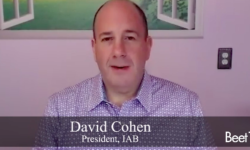When the world is on fire, how can corporate America help citizens douse the flames?
In 2020, the nation is living through a virus pandemic and racial tension. Marketers had already been challenged to respond to the former, now they are also contending with the latter.
So, how should brands best behave? Using a unique empathy or not at all, says Raja Rajamannar, the chief marketing officer of Mastercard and president of the World Federation of Advertisers, in this video interview with Beet.TV
These topics will be explored later this month as the virtual IAB NewFronts takes place June 22-26.
‘Be unique’
“You can quickly fall into a trap of looking like everybody else,” he says. “In a sea of sameness, you are just one of those folks who are out there, and consumers cannot differentiate one brand from the other.
“In those situations, it is not to even just worth spending your money, because you are just saying something, but nobody is noticing what you’re saying, so what’s the point?
“So it’s very critical for you that you are true to your brand and be differentiated and the unique, but highly relevant to the consumers.”
‘Sea of sameness’
The “sameness” of brands’ response recipe to COVID-19 has been highlighted in a number of recent video skits.
Rajamannar has a prescription he thinks can avoid creative homogeneity.
- “Be sensitive to people, their feelings, their emotions, and their situations. If you’re tone deaf, that’s going to be disastrous for your company, for your brand, for your product.”
- “Be authentic. Be genuine. If you don’t have anything to say, simply shut up and save your marketing dollars … Nothing is going to be more wasteful as faking something. Just stay on the sidelines.”
- “Let people know that you’re there for them. It is about serving them. It’s not about self-service. It’s not about being opportunistic. But it is truly being in service of the people.”
The current moment is, in a way, the high-water mark so far of “purpose-driven” brand marketing, the trend which began a number of years ago.
But it is also a moment in which some consumers are more actively holding brands to account on their purpose, even their lack of expression of purpose, and some are growing weary and cynical of purpose-centric marketing.
Huge responsibility
All that is a minefield for brands to walk through. Rajamannar, whose World Federation of Advertisers members control $1.2 trillion marketing budget, says those companies have “a huge level of responsibility … to either shape the cultures around the world or to address and solve the problems”.
He recommends the companies focus on three kinds of stakeholders:
- Employees: “You need to give them a sense of reassurance that we understand as a company what they are going through.”
- Consumers: “Don’t try to sell. This is the opportunity to build a trust that is very deep and on solid foundations.”
- Communities: “(They) expect you to take a stance on issues that they believe in. They want you to take action.”
This video is a preview in a series leading up to the 2020 IAB NewFronts. Please visit this page for additional segments from the Road to the NewFronts 2020. This Beet.TV series is presented by the IAB.






































